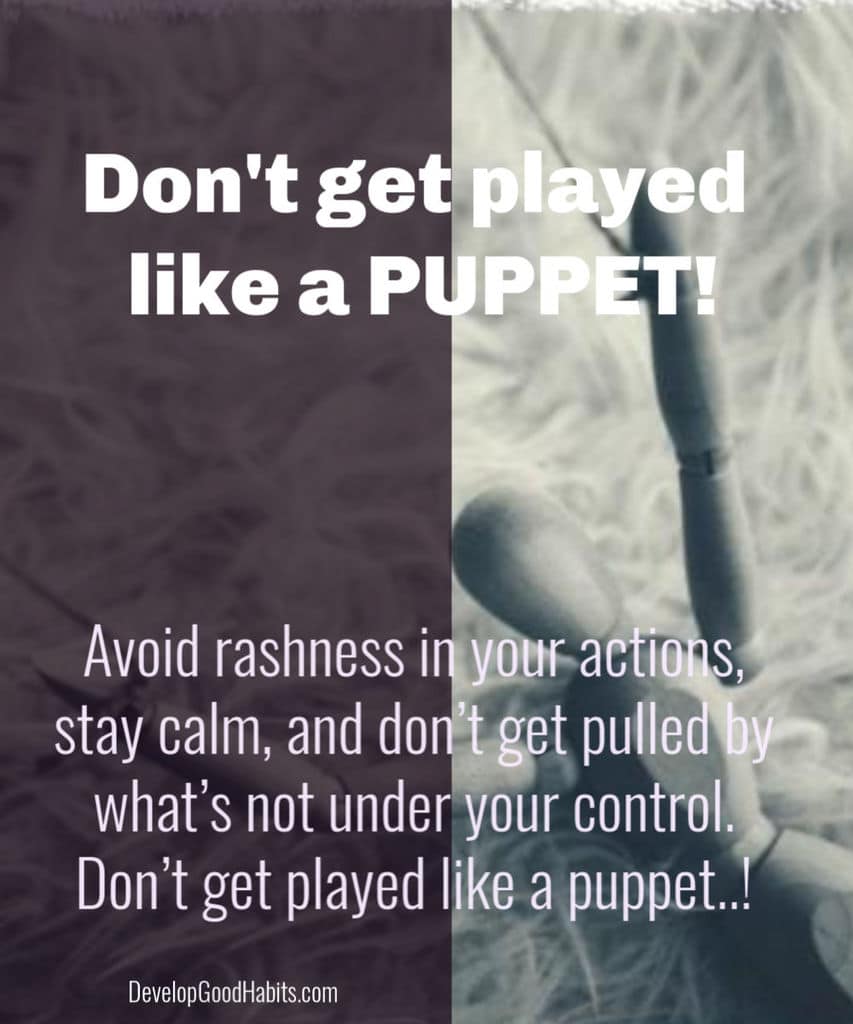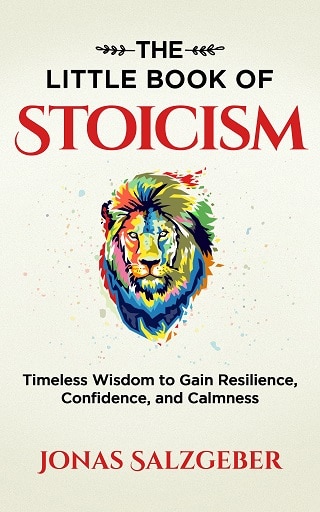Stoic philosophy has become popular again. Yet most people do not know what stoicism all about.
Learn how to be Stoic and what to do in real life to reap this wonderful philosophy’s benefits?
What is Stocism?
Stoicism, just like an old reliable walking stick, is a guide to life based on reason rather than faith that supports you in the pursuit of self-mastery, perseverance, patience, and wisdom. Despite the philosophy’s age, its invaluable tools to excel in life feel modern and fresh.
By adopting Stoicism as a way of life, you’ll discover that philosophy is built for action, not endless head-scratching. It’s a lifelong path to resilience, confidence, and calmness – essential skills to thrive no matter what life throws at you.
In his book THE LITTLE BOOK OF STOICISM: Timeless Wisdom to Gain Resilience, Confidence, and Calmness, Jonas Salzgeber introduces the ready-to-use mix of timeless wisdom and empowering advice that will point the way to anyone seeking a calm and wise life.
In this article, he answers the question, “How to Be Stoic” with ten practical mindsets to adopt for everyday life. In the end, it’s not what happens to us but our reactions to it that matter.
Don’t get overwhelmed by all the 10 how to be Stoic mindsets. Find one that you like, and put it into practice. If you read all ten, you risk not putting any of them into action. As Stoic teacher Epictetus asked his students:
“If you didn’t learn these things in order to demonstrate them in practice, what did you learn them for?”
It’s time to dive in. How to be Stoic? Here are ten mindsets to live by.
10 Mindsets that Cultivate Stoicism
1. Be Kind
The Stoics saw your ability to show kindness as an opportunity. It’s your chance to make someone’s day. A smile, an honest compliment, or thanking the cashier – nothing can hinder you from being kind. It’s always possible.
“Kindness is invincible,” says Marcus Aurelius, as long as it’s sincere. “For what can even the most malicious person do if you keep showing kindness?”
Next time you get treated meanly, don’t fight back but accept it. Don’t resist what happens. Accept it as it is and respond with tolerance and kindness, it’s the best you can do.
“Most rudeness, meanness, and cruelty are a mask for deep-seated weakness,” says Ryan Holiday. “Kindness in these situations is only possible for people of great strength.”
Be kind and show your strength.
2. Be An Eternal Student
“Leisure without study is death—a tomb for the living person.” – Seneca
Never take a day off from learning.
We shall not only leave the remnants of time to learning, but we must actively make time for it. That’s what we’re here for. To seek wisdom to improve ourselves, to get better, to learn how to be a good parent, spouse, and friend.
“The value of education, like that of gold, is valued in every place,” Epictetus eloquently said.
You don’t have an excuse.
Today, it’s easier than ever to learn something new every day. Wisdom is abundant all over the internet. Books are cheap and get delivered directly to your comfy reading chair. We can learn from the smartest people who ever lived—for a few bucks. Learn and don't be afraid to ask philosophical questions to broaden your perspective.
3. Say Only What Isn’t Better Left Unsaid
“Let silence be your goal for the most part; say only what is necessary, and be brief about it. On the rare occasions when you’re called upon to speak, then speak, but never about banalities like gladiators, horses, sports, food and drink—common-place stuff. Above all don’t gossip about people, praising, blaming or comparing them.”– Epictetus
Did you ever notice that people speak primarily about themselves? Even if they ask questions, as soon as they see the chance, they jump in and talk about something related to them.
Whatever the topic, they will find something from their own life to add to the conversation. That’s what we do. We like to talk about ourselves.
The problem with that? We don’t listen with the intention to understand but we prepare what we want to say next.
The Stoic mindset to adopt here is twofold:
(1) Don’t gossip. Don’t blame. Don’t complain. Don’t talk too much. Especially not about what’s not meaningful.
And (2) listen instead. Listen with the intention to understand what the other person is trying to say.
“It’s better to trip with the feet than with the tongue,” as Zeno of Citium, the founder of Stoicism, said.
(For more inspiration, here are more quotes about silence.)
4. Don’t Get Disturbed and Buy Tranquility Instead
“Starting with things of little value—a bit of spilled oil, a little stolen wine—repeat to yourself: ‘For such a small price I buy tranquility and peace of mind.’” – Epictetus
“I buy tranquility instead.” This sentence saved me countless times from getting angry and irritated. How often do we get angry at trifles? How often do we lose our mind for something as insignificant as a fart in the bathroom?
We let small things arouse our anger, and our consequential actions arouse anger in others, and so forth. The Stoics want to stay calm even in the midst of a storm, and yet we go crazy when our roomie forgets to do the dishes, leaves skid marks behind in the toilet, or doesn’t do his chores.

Stay calm and don't get disturbed. Buy tranquility instead.
It doesn’t need to be this way. Before you react to whatever arouses anger within, say to yourself: “I buy tranquility instead.” Then smile, do what needs to get done, and move on with your life. This will save you a ton of nerves and energy.
You will soon realize that the small things that usually irritate you are not worth the hassle.
[Want to learn more about other philosophies? Read more in these philosophy books]
5. See the Opportunity in Challenging Situations
Difficult situations in life are only obstacles if we make them so. It depends on how we look at those challenges—we can either see obstacles and get blocked, or we can see opportunities and make progress.
The Stoics searched for an opportunity for growth in every challenge. No matter what life threw at them, they had the choice: Would they be blocked by challenges, or would they fight through them?
How to be Stoic? Adopt this mindset. Either we shrink or we grow.
This all comes down to our perception. The same situation can either be perceived as a lead ball chained to your feet or as wings growing out of your shoulder blades. How you interpret the challenge is crucial to your success of overcoming it. Ultimately, it’s never the challenges that matter, but what you do with them.
And hey, this isn’t about wearing rose-tinted glasses. Terrible things happen, that’s sure. This is just showing that you always have a choice. Either you bury your head in the sand when things seem to turn against you, or you keep your head up and see it as an opportunity for growth. Your choice.
6. Choose Courage and Calm over Anger
“Keep this thought handy when you feel a fit of rage coming on—it isn’t manly to be enraged. Rather, gentleness and civility are more human, and therefore manlier. A real man doesn’t give way to anger and discontent, and such a person has strength, courage, and endurance—unlike the angry and complaining. The nearer a man comes to a calm mind, the closer he is to strength.” – Marcus Aurelius (Read more Marcus Aurelius quotes here.)
Anger is a passion, a negative emotion the Stoics wanted to minimize.
Anger, the desire to repay suffering, is brief madness, says Seneca. Because an angry man lacks self-control, is forgetful of kinship, deaf to reason and advice, gets aroused by trifles, and doesn’t know what’s true and false—“very like a falling rock which breaks itself to pieces upon the very thing which it crushes.”
Getting angry hurts yourself the most.
“The sword of justice is ill-placed in the hands of an angry man,” Seneca said.
We can find sufficient inducement without anger—with the right values in place such as love, compassion, justice, and courage.
7. Play Your Given Cards Well
“Life is neither good nor bad; it is the space for both good and bad.” – Seneca
Think of different life situations as hands you were dealt like in poker. The hands are dealt by chance; you have no say in what you’ll get. Basically, these life situations are neutral. What matters now is how well you play them. It’s all you control.
“In poker as in life, you can win with any hand. Sure, you prefer double ace and a healthy wife, but that’s not up to you.” This analogy from The Little Book of Stoicism goes on: “What’s up to you is what you do with the given situation. Once the hand has been dealt, you have no choice but accept what’s too late to change, and you wish no longer for a more preferable hand but for the strength to play it the best you can.”
An admirable player tries to play their given hands the best they can. And then accept the outcome calmly, focus on what they control, and then play on.
In the end, it’s not the given cards that matter, but what you do with them. You don’t control all that happens to you in life, but you have the power to choose what to do with the given situations.
[Want to learn more about stoicism and other philosophies? Learn from these philosophy podcasts]
8. Love Whatever Happens
“O world, I am in tune with every note of thy great harmony. For me nothing is early, nothing late if it be timely for thee. O Nature, all that thy seasons yield is fruit for me.” – Marcus Aurelius
Amor Fati – Accept rather than fight every little thing that happens. If we resist reality, if we think things are going against us, then we will suffer.
“If this is the will of nature, then so be it.” That’s a maxim the Stoics lived by. We must acknowledge that there’s something bigger than us, and that we don’t control everything that happens around us.
The Stoics said we should adapt to whatever happens so that nothing happens against our will and nothing that we wish for fails to happen. Let’s bring our will into harmony with what’s going on around us. “Fate leads the willing, and drags along the reluctant,” as Seneca put it.
Nature is immensely complex and it’s impossible to tell whether anything that happens is good or bad. Because you never know what will be the consequences of misfortunes. And you never know what will be the consequences of good fortune. (Stolen from this recommended YouTube video: The Story of the Chinese Farmer.)
We can’t change what already is. Therefore it’s smartest to adopt this Stoic mindset and accept reality, focus on where your power lies, and try to make the best with what’s given.
9. Don’t Get Played Like a Puppet
“If a person gave away your body to some passersby, you’d be furious. Yet you hand over your mind to anyone who comes along, so they may abuse you, leaving it disturbed and troubled—have you no shame in that?” – Epictetus
The ambiguous remark of a colleague, the boyfriend who didn’t call, or the comment of a stranger—we get spun around by things beyond our control. Like puppets, we let external circumstances and other people pull the strings and dance to their liking.

Avoid rashness in your actions, stay calm, and don’t get pulled by what’s not under your control. Don’t get played like a puppet.
We dance to sunshine and stomp to rain. We cheer the goal of our favorite team and bemoan the late equalizer. This is madness. The mind is our own. But we’re unaware and oops, it’s in the hand of the weatherman or the ref.
Hey, let’s wake up! We are able to decide what external events mean to us. We don’t have to get jerked around by what happens around us. We can actually remain calm without getting hurt or irritated.
Cut the strings that pull your mind. Take back what’s meant to be yours. Stop the madness. Avoid rashness in your actions, stay calm, and don’t get pulled by what’s not under your control. You’re not a puppet.
10. Play the Equanimity Game
“When force of circumstance upsets your equanimity, lose no time in recovering your self-control, and do not remain out of tune longer than you can help. Habitual recurrence to the harmony will increase your mastery of it.” – Marcus Aurelius
We all get caught off guard from time to time. Not just by major events, but also by minor, often unexpected occurrences. The train doesn’t arrive on time, your bike gets stolen, your friend cancels the date at the last minute.
It’s in weak moments when such insignificant situations can knock us out. We lose balance and become irritable and grouchy.
Look, there’s no problem in getting thrown out of balance sometimes, it happens to all of us. As a Stoic student, you know this. Your main goal is to recover as quickly as possible. Like a punching ball that rebounds whenever you hit it.
The most important: Get back to balance as soon as possible. Don’t be knocked out any longer than necessary. Get a hold on yourself and get back up! Return to balance.
Modern philosopher Brian Johnson calls this the Equanimity Game. The rules are simple: (1) notice when you’re off-balance, then (2) see how fast you can catch yourself and correct yourself—bringing yourself back to equanimity.
NOW: Put at Least One Mindset into Action
“That’s why the philosophers warn us not to be satisfied with mere learning, but to add practice and then training. For as time passes we forget what we learned and end up doing the opposite, and hold opinions the opposite of what we should.” – Epictetus
The danger is obvious: We learn new things but fail to put them into practice. Don’t let that happen with these Stoic mindsets. Choose one, decide where and when you want to put into action, and then do it.
Lead by example.
[Want to improve your life? Learn how to develop a growth mindset.]
Did You Enjoy These Stoic Mindsets?
The Little Book of Stoicism is packed with illustrations and practices that will show you how to deal more effectively with life’s challenges and how to finally live up to what you’re truly capable of. For men and women alike, this direct and digestible guide helps you understand and, most importantly, put the ancient wisdom from a book page into action in the real world.
Alternatively, the author offers a FREE PDF with 20 Stoic Practices you can download here.
To learn more about Stoicism, check out our article on the 4 Stoic Virtues: A Breakdown of the Core Stoicism Principles.

Jonas Salzgeber is an author and writes for a small army of remarkable people at NJlifehacks.com. On his quest to be the best he can be he stumbled upon Stoicism – and got hooked. At the core of this applicable philosophy lies the goal of leading a happy life even (especially) in the face of adversity.



